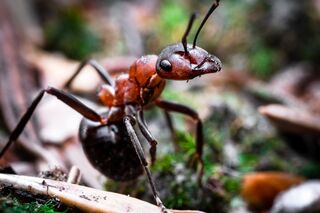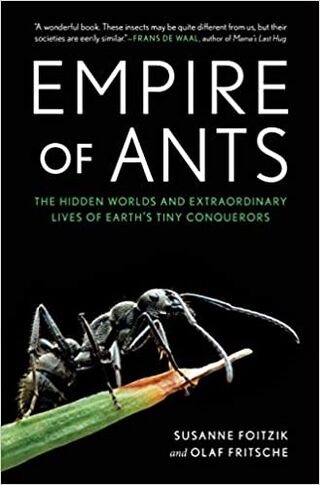Environment
Empire of Ants: Their Extraordinary Lives and Hidden Worlds
A new book explains all you ever wanted to know about these tiny conquerors.
Posted April 5, 2021 Reviewed by Davia Sills
Key points
- Research shows that ants and their intricate microbe communities are vital to maintaining the integrity of diverse ecosystems.
- Insects like ants show highly evolved cognitive skills and social complexity.
- For example, ants defend their nests by social distancing and vaccination.

“If all mankind were to disappear, the world would regenerate back to the rich state of equilibrium that existed ten thousand years ago. If insects were to vanish, the environment would collapse into chaos.” —Edward O. Wilson, world-renowned ant researcher
I love bugs and learning about their amazing lives, including their highly evolved cognitive skills and complex and dynamic patterns of social living. I'm also pleased to learn that many other people are intrigued by these tiny beings and want to know more about these nonhuman animals (animals), far too many of whom are written off as pests, demeaned and misrepresented in media, smushed, or killed without any thought or regret. Nonetheless, scientific research clearly shows that numerous insects and their intricate microbe communities are vital to maintaining the integrity and biodiversity of many different ecosystems, including trophic cascades, more so than charismatic megafauna with whom far more people are more familiar.
I recently read a wonderful book by Johannes Gutenberg Universität Mainz evolutionary biologist Susanne Foitzik and science journalist, and biophysicist Olaf Fritsche aptly titled Empire of Ants: The Hidden Worlds and Extraordinary Lives of Earth's Tiny Conquerors, a wonderful followup to another book called Wasps: The Astonishing Diversity of a Misunderstood Insect. A short trailer about the Empire of Ants can be seen here.
Here's what Susanne and Olaf had to say about their highly informative, beautifully illustrated, and easy-to-read new book.1,2
Why did you write Empire of Ants?
Susanne: I have conducted research on ants for more than 25 years, and I am always surprised by how easy it is to fascinate the public with stories from the ants. Everybody has encountered ants, in the garden, on the pavement, sometimes in the house, but generally, little is known about their biology. When Olaf and our publisher approached me with the idea to write a book, which provides deeper insights into the behavior and evolution of ants and the scientists who study them, I was on board. While I have written many scientific articles and book chapters, I was happy to learn from Olaf, a biologist himself, about how to write a book that is both entertaining and informative.
Olaf: As a professional science writer, I'm always curious to explore new worlds. When I first started reading about ants, I was blown away by the fascinating universe at our feet. It is absolutely amazing what these tiny creatures do and accomplish, but most of us, myself included at the beginning, know next to nothing about these wonders. So it became clear very quickly that I needed to find a leading expert in this field and write a book with her about these exciting societies.

How does your book relate to your backgrounds and general areas of interest?
Susanne: My research focuses on the evolution and behavior of ants, which I have studied for a quarter-century by now. I observe ants in the field, but also in laboratory experiments; I studied many different species, from huge army ant colonies to the tiny Temnothorax ants, a colony of which fits perfectly into an acorn.
In recent years, I have also used molecular biological techniques to study the genes underlying their behavior and how molecular mechanisms regulate the division of labor in their societies or the lifespan and fecundity of ant queens, which can live in some [cases] more than 30 years and lay millions of eggs during their long life.
Olaf: I am also a biologist by training and hold a Ph.D. in biology. However, I was always more excited about passing on knowledge. That is why I became a science writer, and I write about many very different topics, from the life of bacteria to the origin of the cosmos.
Who is your intended audience?
Susanne: I would say everyone who is interested in ants, their complex societies, and fascinating behaviors. From teenagers to older adults, from school teachers to bus drivers, we hope that many people who are interested in nature and the world around them will read our book and will be fascinated by the biology of these little critters as much as we are.
Olaf: Anyone who has retained their curiosity and wants to learn more about this fascinating world. It is a book to marvel at for the whole family.
What are some of the topics that are woven into your book? What are some of the major messages?
Susanne: In our book, we introduce the audience to the behavior and evolution of many different ants, from the agriculturist leaf-cutters, over herders who tend aphids, to the fierce army ants, and to my favorites, the slavemaking ants. Slavemaking ants conduct recurrent slave raids on free-living host colonies to steal worker brood. Once these stolen workers emerge from the pupae, they work for the slavemakers as slaves conducting all necessary tasks in their colony from brood care to foraging.
We describe how slavemakers use chemical weapons to manipulate defenders into attacking each other instead of turning against their attackers. We show that some hosts become resistant to this manipulation and that in some populations, such as one from New York, enslaved ant workers rebel against their oppressors and kill their offspring. These fights and selfish acts occur in acorns in the leaf litter on the forest floor, right at our feet, and we often do not even know it.
We also have stories on how parasitic worms manipulate the behavior of ants and how ant societies defend their nests against infectious diseases by very much the same measures that our societies are currently using, decreasing social contact and vaccination. By giving insights into such parallel complex worlds, we hope to encourage people to care for our environment and all creatures who inhabit it. And, last but not least, we give insights into how scientists study these ants, their adventures in different parts of the world, from rain forests to deserts to laboratories.
How does your book differ from others that are concerned with some of the same general topics?
Susanne: We try to tell stories that keep the readers both fascinated and entertained, while at the same time we make sure that the information given is scientifically correct. We provide insights into the lives of researchers studying ants so that the reader can go with us on our adventures. Colorful illustrations further help to intrigue the reader to these social animals, who are so often overlooked because of their small size.
Olaf: What makes this book special is that the readers discover the world of ants through Susanne's eyes. You are right in the middle of it.
What are some of your current projects?
Susanne: I've currently returned to research and to write scientific articles about our findings. The most recent scientific papers investigated how ants respond to social isolation (by altering their behavior and by immune depression, very much like humans), how ant queens can become several decades old (by fighting against oxidative stress and cancer), how parasitic worms manipulate the behavior of ants and extend their lifespan five-fold, and how slavemaking ants engage in a coevolutionary arms race with their hosts. Furthermore, I give talks and interviews on TV and radio to get more people interested in ants and in preserving their habitats.
Olaf: I have written a non-fiction book on insects and am collaborating on a textbook for undergraduate biology. I am also writing my first novel. It's a thriller in which I'm incorporating some of my new knowledge about ants.
Is there anything else you'd like to tell readers?
Susanne: We hope that this book will be a revelation for many readers, who will look more carefully the next time they encounter ants in their garden or park.
Olaf: The world is full of wonders. And most of them are not far away at all but lie right at our feet.
References
Notes
1) Susanne Foitzik is an evolutionary biologist and behavioural scientist. She was already researching the behaviour and evolution of ants during her doctorate. After research stays in the USA, she first taught at the LMU Munich and now holds a chair at the Johannes Gutenberg University in Mainz. Her research focusses on the coevolution between slavemaking ants and their hosts, the manipulation of ant behaviour by parasites and the evolution and genomics of ageing and division of labour in insect societies. Her scientific results have been published in over 120 scientific papers.
Olaf Fritsche holds a PhD in biology. He worked for several years on the German edition of Scientific American before becoming a freelance journalist writing for numerous newspapers and magazines. He writes non-fiction books about all the big and small wonders of this world, textbooks for students, and thrilling novels. His credo is: Science doesn't have to be complicated, but it has to be exciting!
2) The book's description reads: Ants number in the ten quadrillions, and they have been here since the Jurassic era. Inside an anthill, you’ll find high drama worthy of a royal court; and between colonies, high-stakes geopolitical intrigue is afoot. Just like us, ants grow crops, raise livestock, tend their young and infirm, and make vaccines. And, just like us, ants have a dark side: They wage war, despoil environments, and enslave rivals—but also rebel against their oppressors. Engineered by nature to fulfill their particular roles, ants flawlessly perform a complex symphony of tasks to sustain their colony—seemingly without a conductor—from fearsome army ants, who stage twelve-hour hunting raids where they devour thousands, to gentle leafcutters cooperatively gardening in their peaceful underground kingdoms. Acclaimed biologist Susanne Foitzik has traveled the globe to study these master architects of Earth. Joined by journalist Olaf Fritsche, Foitzik invites readers deep into her world—in the field and in the lab. (How do you observe the behavior of ants just millimeters long—or dissect a brain the width of a needle?) Richly illustrated and photographed in full color, Empire of Ants will inspire new respect for ants as a global superpower—and raise new questions about the very meaning of “civilization.”
Bekoff, Marc. Ants Rescue Sibs From Spider Webs and Surprise Us Once Again. (Harvester ants join chimpanzees and mountain gorillas in the "rescue club.")
_____. Ants Show Organized Healthcare and Treat Wounded Comrades. (This is the first observation of animals routinely treating injured individuals.)
_____. Lonely Ants Die Young: They Don't Know What to Do When Alone. (Socially isolated ants lose digestive functions and suffer due to this loss.)
_____. Do Less Harm: Ants and a Simple New Years Resolution. (Cutting off an ant's legs isn't simply an ant "makeover.")
Nalls, Gayle. Like Us, They Kill and Consume. But Could They Save Us? (We are just discovering ants' unique abilities.) Psychology Today, June 29, 2017.




